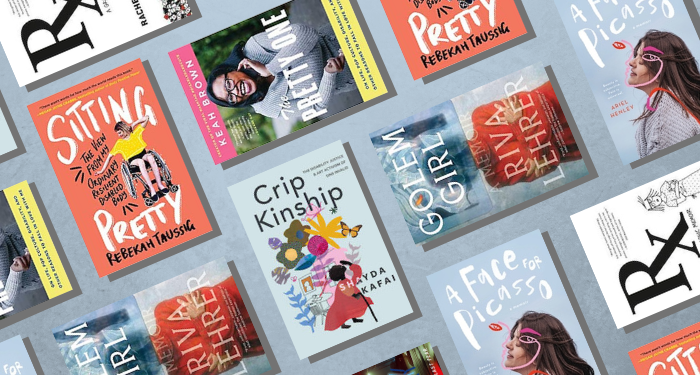When the bookish world celebrates marginalized voices in literature, I rarely see disabled, chronically ill, d/Deaf, and neurodivergent writers highlighted by non-disabled related outlets. Or, if they are highlighted, their disabilities are erased from their stories. But disabled people, especially folks of marginalized genders, have long been at the forefront of social change. Non-disabled society’s erasure of disabled people’s stories from the narrative means that we never learn about these incredible advocates and their work.
When I scour the internet for more books to add to my TBR, I browse shelves and scroll through recommended reading lists, always hoping to see someone like me whose body just works a little differently. While I still don’t spot as many as I would like, disabled people of marginalized genders have written and published some incredible books in the last several years. Authors like Jenny Lawson and Samantha Irby use their wit and humor to describe their lives. Alice Wong and Carly Findlay each edited fantastic anthologies filled with excellent disabled writers.
If you’re like me and looking for your next great disability-related read, browsing virtually or otherwise, here are ten excellent choices. You can’t go wrong with any of these excellent authors, so whether you like graphic novels, memoirs, or disability theory, there’s something here for you!
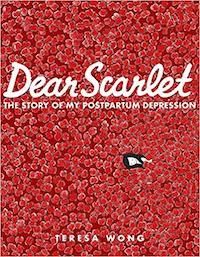
Dear Scarlet: The Story of My Postpartum Depression by Teresa Wong
Through her illustrated memoir, Teresa Wong shares the story of her experience with postpartum depression (PPD). The graphic memoir is structured as a letter to her daughter, Scarlett. She expresses her struggles with feelings of never being enough and the incomprehensible sadness.

Dirty River: A Queer Femme of Color Dreaming Her Way Home by Leah Lakshmi Piepzna-Samarasinha
Care Work author Leah Lakshmi Piepzna-Samarasinha spent some time in Canada traveling and meeting queer people looking for a new kind of love and revolution. But haunted by her past, Piepzna-Samarasinha must reckon with what is means to be a queer, disabled femme in this world.

Crip Kinship: The Disability Justice & Art Activism of Sins Invalid by Shayda Kafai
Shayda Kafai’s Crip Kinship looks at Sins Invalid, a performance project that focuses on disability justice. The movement empowers disabled people of color, centering the work of queer, trans, and gender-nonconforming folks.
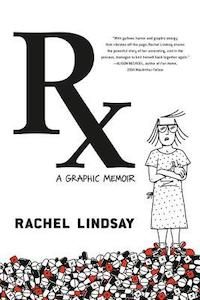
Rx: A Graphic Memoir by Rachel Lindsay
An early 20-something living in New York City, Rachel Lindsay is diagnosed with bipolar disorder. To help her pay for her healthcare, she takes a job in marketing and finds herself working for Pfizer. Now she’s assigned to work on ads for an antidepressant drug.

A Face for Picasso: Coming of Age with Crouzon Syndrome by Ariel Henley
Ariel and her twin sister Zan were the first twins known to survive Crouzon syndrome, which is a rare condition where the bones in the head fuse prematurely. Growing up, Ariel and her sister experienced many procedures on their faces, which was very painful. But they also moved through life with a facial difference. Henley’s young adult memoir explores her life and the concept of beauty and identity.

Golem Girl: A Memoir by Riva Lehrer
When Lehrer was born with spina bifida in the 1950s, doctors told she could never have a romantic relationship, a job, or any kind of independence. But when she discovers a collective of people creating art, Lehrer finds a way to express herself that helps her accept herself for who she is.
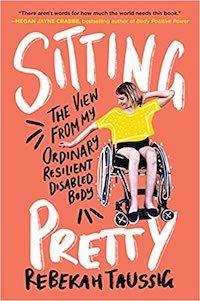
Sitting Pretty: The View from My Ordinary Resilient Disabled Body by Rebekah Taussig
In Sitting Pretty, Rebekah Taussig examines the complex realities of living as a disabled woman in an ableist society. In her essays, she describes her life growing up as a paralyzed girl in the ’90s and ’00s. Taussig describes her firsthand experience with the feeling of never seeing positive disability representation, and how disabled people are so often portrayed as villains.

Haben: The Deafblind Woman Who Conquered Harvard Law by Haben Girma
The daughter of Eritrean immigrants, Haben grew up visiting her family and found resilience and courage in her family’s stories. Later, she saw her disability as an opportunity for innovation, creating her own text-to-braille communication system.
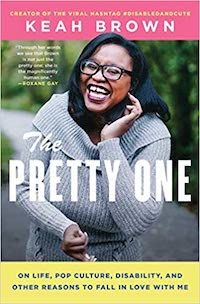
The Pretty One: On Life, Pop Culture, Disability, and Other Reasons to Fall in Love With Me by Keah Brown
Creator of the #DisabledAndCute campaign on social media, Keah Brown describes her approach to life in her memoir The Pretty One. Brown shares her unique perspective as a Black disabled woman with cerebral palsy.
These wonderful book are just the tip of the iceberg. Dozens more books await! For more books by disabled authors, check out 10 Books on Disability Justice and 9 Middle Grade Novels with Disabled Main Characters.
